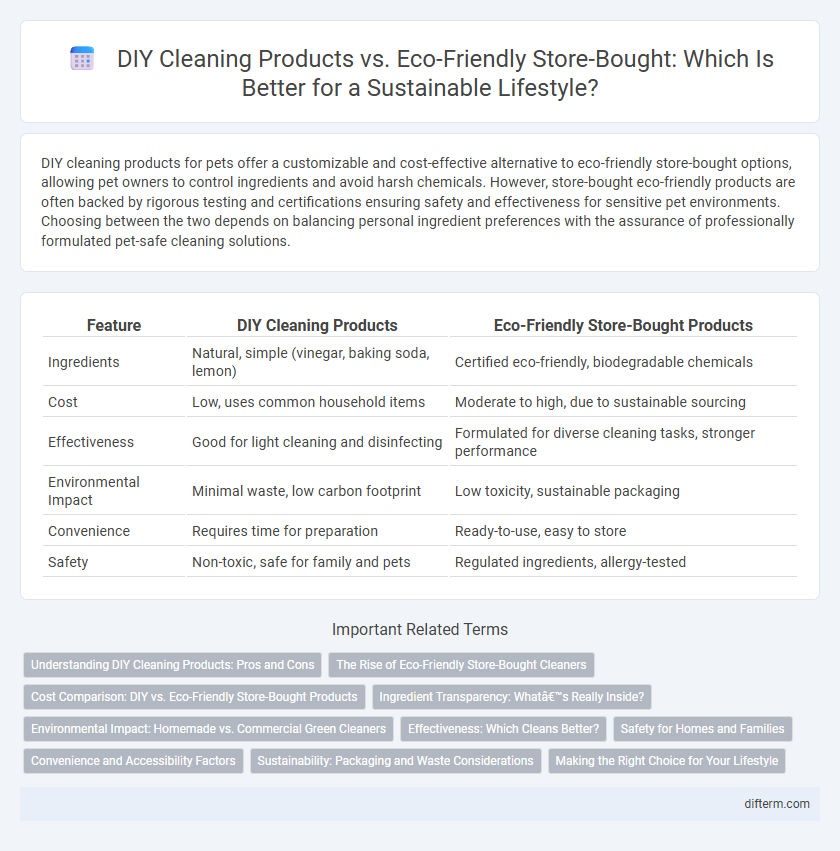DIY cleaning products for pets offer a customizable and cost-effective alternative to eco-friendly store-bought options, allowing pet owners to control ingredients and avoid harsh chemicals. However, store-bought eco-friendly products are often backed by rigorous testing and certifications ensuring safety and effectiveness for sensitive pet environments. Choosing between the two depends on balancing personal ingredient preferences with the assurance of professionally formulated pet-safe cleaning solutions.
Table of Comparison
| Feature | DIY Cleaning Products | Eco-Friendly Store-Bought Products |
|---|---|---|
| Ingredients | Natural, simple (vinegar, baking soda, lemon) | Certified eco-friendly, biodegradable chemicals |
| Cost | Low, uses common household items | Moderate to high, due to sustainable sourcing |
| Effectiveness | Good for light cleaning and disinfecting | Formulated for diverse cleaning tasks, stronger performance |
| Environmental Impact | Minimal waste, low carbon footprint | Low toxicity, sustainable packaging |
| Convenience | Requires time for preparation | Ready-to-use, easy to store |
| Safety | Non-toxic, safe for family and pets | Regulated ingredients, allergy-tested |
Understanding DIY Cleaning Products: Pros and Cons
DIY cleaning products offer a customizable, cost-effective alternative to commercial eco-friendly brands, often utilizing natural ingredients like vinegar, baking soda, and essential oils that reduce exposure to harsh chemicals. However, their effectiveness varies depending on the specific cleaning task and ingredient combinations, potentially requiring trial and error to achieve consistent results. While DIY options minimize plastic waste and enhance ingredient transparency, they may lack the standardized formulations and efficiency found in certified eco-friendly store-bought products.
The Rise of Eco-Friendly Store-Bought Cleaners
Eco-friendly store-bought cleaners have surged in popularity due to increased consumer awareness of environmental impact and convenience. Brands like Seventh Generation and Mrs. Meyer's offer biodegradable formulas free from harsh chemicals that effectively tackle household grime while reducing plastic waste with recyclable packaging. The rise of these products reflects a shift toward sustainable living, blending efficacy with eco-conscious values in everyday cleaning routines.
Cost Comparison: DIY vs. Eco-Friendly Store-Bought Products
DIY cleaning products typically cost significantly less than eco-friendly store-bought options due to the use of common household ingredients like vinegar, baking soda, and lemon juice. While initial investments in reusable containers and essential oils may be required, the overall expense per cleaning session remains lower compared to purchasing pre-formulated eco-friendly products. Consumers can achieve effective cleaning results and reduce their environmental impact while benefiting from substantial cost savings by choosing DIY solutions.
Ingredient Transparency: What’s Really Inside?
DIY cleaning products offer complete ingredient transparency by allowing users to control every component, often utilizing natural substances like vinegar, baking soda, and essential oils. In contrast, eco-friendly store-bought cleaners sometimes mask full ingredient disclosure behind vague labels such as "plant-based" or "biodegradable," making it difficult to verify their true environmental impact. Understanding ingredient transparency is essential for consumers aiming to minimize exposure to harmful chemicals and support genuinely sustainable cleaning practices.
Environmental Impact: Homemade vs. Commercial Green Cleaners
DIY cleaning products reduce plastic waste and limit harmful chemical runoff by utilizing natural ingredients like vinegar, baking soda, and essential oils, which biodegrade quickly. Commercial eco-friendly cleaners often contain certified biodegradable ingredients and sustainable packaging but may still involve industrial processes with larger carbon footprints. Choosing homemade cleaners minimizes resource consumption and supports zero-waste efforts, while store-bought green cleaners provide convenience with varying degrees of environmental certification.
Effectiveness: Which Cleans Better?
DIY cleaning products often use natural ingredients like vinegar and baking soda that effectively tackle common household grime but may lack the targeted strength of eco-friendly store-bought cleaners formulated with advanced, biodegradable enzymes and surfactants. Eco-friendly store-bought products provide consistent results due to rigorous testing and optimized pH levels, ensuring tougher stains and bacteria are eliminated while remaining safe for the environment. Consumer reviews and lab tests frequently highlight that store-bought eco cleaners outperform most DIY blends in terms of quick action and residual cleanliness without harsh chemical residues.
Safety for Homes and Families
DIY cleaning products allow full control over ingredient toxicity, reducing exposure to harsh chemicals harmful to children and pets. Eco-friendly store-bought cleaners are formulated to meet safety standards and often include certifications like EPA Safer Choice, ensuring non-toxic and biodegradable components. Choosing between DIY and commercial options depends on balancing ingredient transparency with the convenience and tested efficacy of branded eco-friendly products.
Convenience and Accessibility Factors
DIY cleaning products offer customizable ingredients, allowing control over potential allergens and harsh chemicals, but require time and effort for preparation and ingredient sourcing. Eco-friendly store-bought options provide immediate accessibility and consistent formulations, with many brands offering packaging designed for sustainability and ease of use. Consumers prioritizing convenience and quick availability often favor store-bought products, while those committed to ingredient transparency and cost-saving lean towards DIY solutions.
Sustainability: Packaging and Waste Considerations
DIY cleaning products reduce plastic waste by enabling reusable containers and minimizing packaging materials, promoting sustainability in household routines. Eco-friendly store-bought options often use recyclable or biodegradable packaging, but may still contribute to waste through single-use plastics and transportation emissions. Choosing DIY solutions or brands with transparent sustainability practices supports waste reduction and encourages environmentally responsible consumption.
Making the Right Choice for Your Lifestyle
Choosing between DIY cleaning products and eco-friendly store-bought options depends on factors like time, cost, and environmental impact. DIY cleaning products offer customization and reduced chemical exposure, while eco-friendly store-bought products provide convenience and verified sustainability certifications. Assess your lifestyle priorities, such as ingredient transparency and effectiveness, to make an informed decision that supports health and eco-conscious living.
DIY Cleaning Products vs Eco-Friendly Store-Bought Infographic

 difterm.com
difterm.com